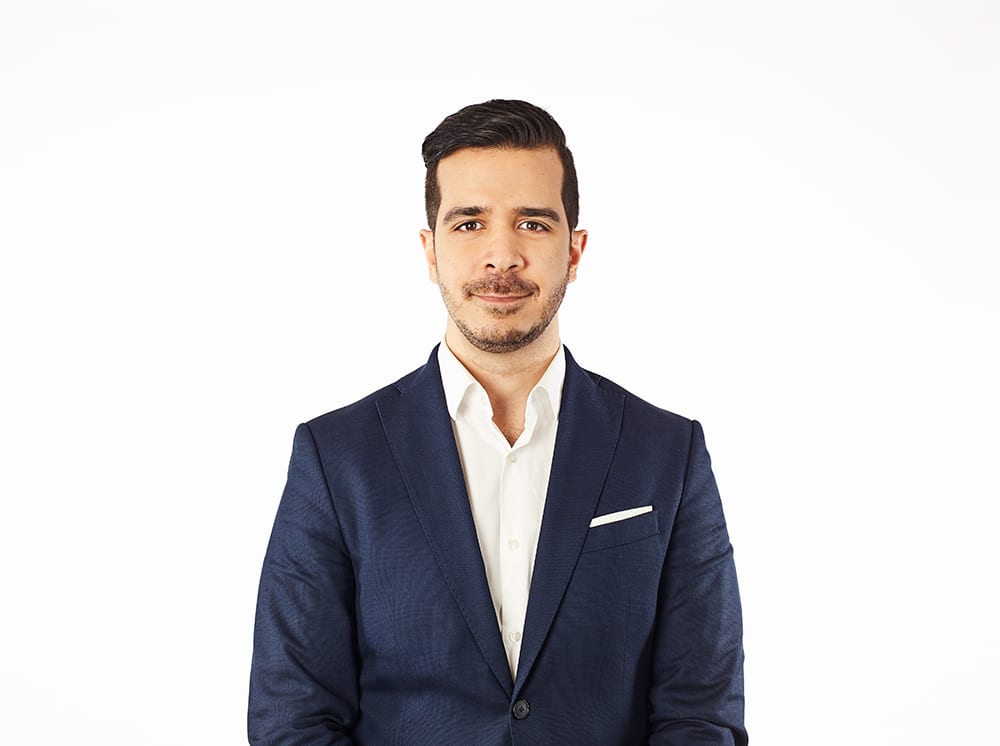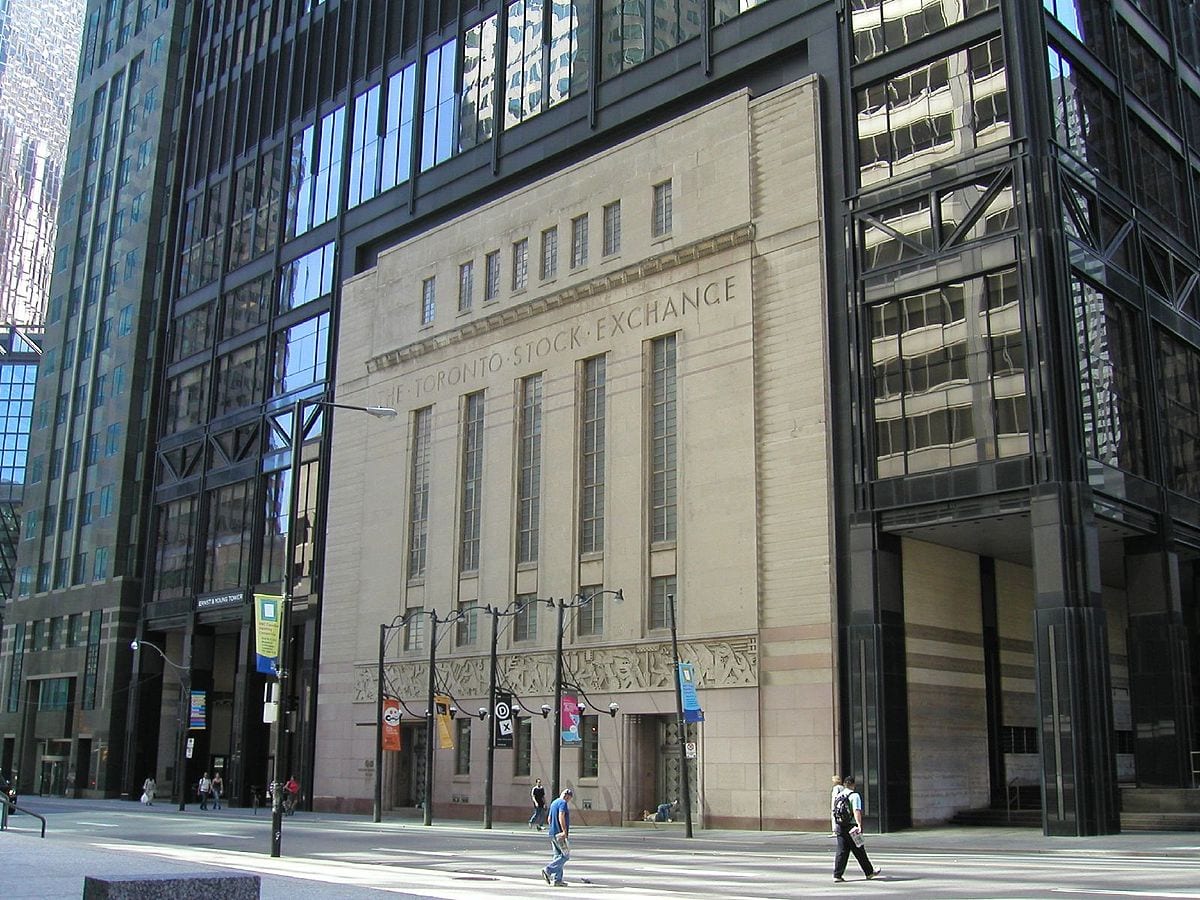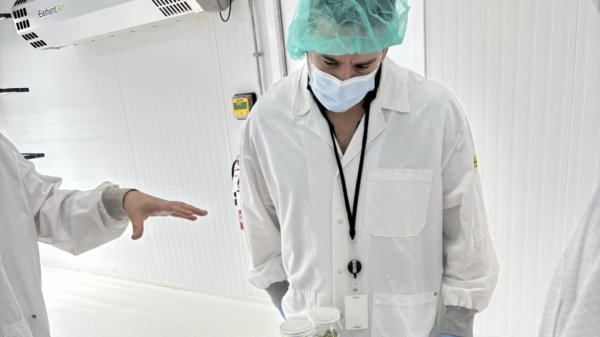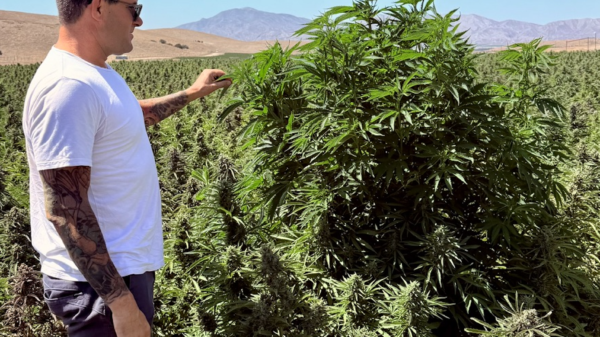As the global total of Covid-19 cases hit its peak Sunday, and the Nasdaq nudged its way to an all-time high Monday, it’s safe to say that Wall Street has been given an entirely new lease on life.
The worst appears to be over, for now, even for the embattled cannabis sector.
For the first month of quarantine in Canada, venture capital firm Canopy Rivers (TSX: RIV) kept its cash close. It reserved resources for its portfolio clients while it waited for the storm to pass. What was clear from the beginning, however, is people were waiting out the storm with weed.
From a business perspective, cannabis has really shown its resiliency, Canopy Rivers CEO Narbé Alexandrian says. Legal cannabis sales spiked in March, and data from April show the increase holding.
But the reality for weed companies is a very different one from a year or even a few months ago. At Canopy Rivers, the size of an average deal has halved since before March 16.
In the following Q&A, Alexandrian shares how his firm has adjusted its strategy to the new normal, why software is becoming increasingly attractive from an investment perspective and what makes U.S. markets profitable yet inherently risky.
The following interview has been edited for length and clarity.
It makes sense that deals sizes have shrunk. The cannabis sector has become significantly less speculative, and companies — at least the ones that appear to be performing well — have narrowed their focus in terms of short-term growth, having strong balance sheets and geography. What other nuance is there to the way deal making has shifted?
To give some more numbers, the median deal size that we were pitched was around US$4 million prior to March 16. Since then that has become about US$2 million. Then there’s a bit of a disconnect between the public markets and the private markets within the cannabis sector ever since the public cannabis market started to implode a bit last summer. Everyone just assumed it was going to be temporary. We still think it’s temporary, but the valuations have come to meet each other in some ways. The decreases in valuation have been mostly from companies only wanting to raise what they need to.

Alexandrian says his company’s seen 2,200 pitches over the past two years. Submitted photo
This isn’t a great time for entrepreneurs to go out to raise capital. There’s a recession looming, there are funds running out of money — especially ones in the U.S. — and going out there to ask for money in this type of scenario means that you’re asking for a difficult deal.
In what other ways has Canopy Rivers’s approach to appraising deals changed?
When Covid first hit we took four weeks initially to just sit back see, ‘How does this affect all of our portfolio companies? Are our portfolio companies in a difficult situation which we need to help them with? Who can we connect them to? How can we do a quick round of financing for them in order to make sure they have enough cash in the coffers to last them through the storm? Also looked at a number of grants that were available, especially for the ones that are more consumer-facing. Those ones face a bit more trouble.
Once we got that out of the way, then we went back into market and said, ‘Okay, so what’s out there?’ There’s companies out there that are looking to raise, there’s companies out there that are just sitting on the sidelines saying they don’t want to do anything until things start shaping up. Well, those companies waiting on the sidelines, unlike a typical time where you can just ping them and say, ‘Well, here’s the valuation come after it,’ you don’t do that in this type of scenario. Instead, you’re going after companies that really need cash because those types of deals are more investor friendly, rather than entrepreneur friendly.
I like to I tell our portfolio companies that the opportunity cost for a lot of investors has changed. If you really need the money, then you have to go and abide by the types of structures that are out there right now. But if you don’t, then might as well just sit back, conserve cash, cut down on burn and focus on getting to 2021 in one piece. Then go out there and raise funds once the Covid scare has lifted.
Read more: ‘Guys, we have one job: survive’
Read more: Canopy Rivers invests $2M into Edmonton edibles company
I’ve also been told you’ve shifted to more of an emphasis on software compared to consumer goods. Is that because software companies are generally more stable, and the overall shift toward online shopping? What else is at play here?
That’s definitely one piece of it. E-commerce has really boomed over the last little while and I’m sure you’ve seen the stats from Shopify of how big e-commerce has gotten over a short period of time. On top of that, cannabis delivery click-and-collect has just started in Ontario and other parts of the country. That created a bit of a boom for, ‘I need software to help me with selling the product. I need software to help me with logistics and making sure my drivers are going to the right location so that they’re not wasting time going from one end of the city to the other.’
For a lot of brands out there, just getting a sense of what the data is and how they can sell, they have to do that all online versus going to talk to someone or getting a presentation from someone. The entire dynamic of how to do business has shifted to online channels. Through that a lot of online businesses have — all my software as a service start-ups — have seen a real big boom in terms of activity and revenue. For a lot of these companies distribution is just sharing code. It’s a much easier way to distribute, especially within Covid. On top of that, they’ve seen a big boom from the e-commerce acceleration.
Read more: Fire & Flower says it has 100K members on its online sales platform
Read more: TIMIA Capital makes $2M investment in Cova Software
Lastly, their revenue models are typically recurring in nature. Even though something like Covid hits, people are still signed on to an annual contract, and still have to pay month by month. So e-commerce has been increasing sales when a lot of brands and retailers have seen decreased sales.
From what I’ve seen, performance in the retail sector has been a mixed bag. How has retail been doing from your perspective?
From a retail perspective, there are two types of thought. One is that if you have the greatest amount of product selection, you have a really cool Apple-looking store, people will come to you. There’s another brand of thought which is, like the liquor store, you just go to the one nearest to you. Sure, there might be a liquor store in Kelowna that sells these very fine vintage wines, but it’s not like you’re going to drive all the way there just for that. Sure, there are some people that might, but not the majority of people.
Read more: Americans are spending their stimulus cheques on weed: Headset
When we look at the retail channel, our perspective is: you need to get to cash flow positive very quickly, you have a box being your shore, your store has a certain amount of traffic that really evens out over time. If you can’t make money off that traffic, there’s no hope for you. Another difficulty of retail is that you might open the first store and might be profitable, but how do you follow that with new locations when finding a location is tough, getting licensed in that location is difficult, and then turning a profit is also difficult?

Retailers have had to adjust their strategies significantly over the past few months to meet the challenges of Covid. Photo by Nick Laba
We think that, from a retail perspective, it’s probably going to be a bit of a consolidation play down the road where a number of these localized retailers that have a few locations will start getting eaten up by a larger player that has more national play. Back end costs will go away because now you have one account that does 50 stores instead of 50 accounts doing 50 stores and you can get to cashflow positive much more easily. Right now it’s trending towards more of a dry cleaner model where I go to the one nearest me, but over time it’ll be more of a franchise-y model where you have a brand name and a number of stores across the country.
Read more: Planet 13 says sales cut in half by Covid-19
A few companies have gone under this year. Are you looking at any fire sales?
We’ve seen some companies go under and do a fire sale. Typically, those aren’t the types of assets that you want to go after. There’s something wrong with those assets. A lot of it hinges on unit economics. If we go back to early 2018, before cannabis was legalized in Canada, companies were racing to get capacity because no one knew how big the market would be. No one knew how fast the market would grow. So they were just picking up greenhouses, outdoor facilities, indoor facilities, extractors and the like. Fast forward to now and we have a better understanding of how the industry works.
If I take flower and pre-rolls, I’ll split them up into two categories. One is value brands: What why can I get for the cheapest price that has 20 per cent THC? It might be a drier flower, it might be not as many terpenes, but I can get it for cheap. Then on the other end of it is: What companies are differentiating themselves? Who is creating quality products? The companies stuck in the middle that neither have low-cost leadership, nor appealing differentiation. Those are the ones that have been going up for fire sales.
If you look at those facilities, you learn a lot from it in terms of what didn’t work in the unit economics. We can pass that on to our portfolio companies on an anonymous basis, saying, ‘Hey, better watch out for processing or packaging because it can eat up $2 from every gram you produce.’ But those types of transactions and the assets behind them, they’re not things you want to invest in. In this cash-crunch of a situation, we politely pass.
Read more: As cannabis bankruptcies accelerate during pandemic, lawyer says survivors will thrive long term
It’s obvious that both Canopy Growth directly, and Canopy Rivers have invested significantly in TerrAscend. It seems TerrAscend is doing well south of the border. Have you also been looking at more deals in the states compared to Canada?
I’d say over the last year 60 per cent of our deal flow has come from the U.S. I think that’s a mixture of attractive opportunity and there’s just more population, so generally you just get more deal flow. What I like about the states is that it’s very fresh ground. Because it’s not federally legal yet means there’s a lot of good value for investment. Then you wait for federal legalization and get a bump up in valuation automatically. I think and I believe that federal legalization is inevitable.
Read more: Hedging bets on US market paying off for TerrAscend
Now, if I take a step back, there are some risks with the U.S. model. One is there’s clearly a federal regulatory risk. Every state is doing something differently, and states can’t talk to each other. But when federal legality takes shape, the states will be able to talk to each other, and right now they’re not all speaking the same language. When that takes place is the federal government going to come down and say, ‘Here’s a set of rules that everyone has to follow,’ or will they say, ‘Let’s take the highest common denominator being California, and now everyone has to follow these rules’? Whichever it is, it’s gonna cause a massive reset for a lot of U.S. companies out there that have invested millions, tens or hundreds of millions of dollars into facilities that are now going to be facing U.S.-wide competition.

Pennsylvania’s booming medical cannabis sector has been a lucrative market for TerrAscend. Creative commons photo
If you’re a hemp or cannabis facility in New York, how do you compete against the one in Arizona where you have cheaper labour, cheaper costs, better sun and there’s less disease-friendly humidity? It’s very difficult to find. So there’s a thought in the back of your head: ‘Is every one of these companies preparing themselves for that reset day?’
How is the relationship with TerrAscend specifically?
The relationship with TerrAscend is great. We were originally invested in their entire entity, then they went over to the U.S. so we got exchangeable shares instead of equity ownership because we’re on the TSX. Canopy Growth got the same thing. Afterwards, in the fall of 2019, we invested $10 million into their Canadian entity. Their Canadian entity is still going strong. They’re pushing towards cashflow positive, like many of the companies there.
On the U.S. side, they’re doing all the right things. Their focus is mainly to the east. They’ve gotten licensed in Pennsylvania. They have licences in Illinois, Jersey and Utah. Their focus is really on the burgeoning high-growth East Coast. They have facilities, they’re EBITDA positive — everything is working positively on that side. And they brought in a seasoned veteran for a CEO in the last six months, Jason Ackerman, who is from Fresh Direct prior to that. A lot of smart people working there are really proud of what they’ve done.
Read more: EBITDA profitability a ‘transformational milestone’ for TerrAscend
I’ve noticed, for example with Canopy Growth, a significant reigning in of international operations. At the same time, a lot of new global markets are opening up. Israel has announced plans to regulate recreational cannabis in the next three months. Are you looking internationally at all, and at Israel in particular?
Twenty per cent of our deal flow comes from international. We look at areas like Australia, New Zealand, Europe, Israel, China and Latin America. We’ve always liked Israel for their medical side. They’ve really put in a lot of effort into understanding terpenes and strains, and how those affect different problems people have. They’re also one of the leaders in clinical trials being done within the country relative to other countries — with Canada being the leader, of course, because of federal legality. We think there’s a lot of value to come out of that.
The population isn’t as large as U.S. markets, so it’s not going to be as big of an opportunity, but it’s definitely something to keep an eye on. It’s a tourist destination as well so you can see how things could progress quickly.
Read more: Israel announces plan to legalize weed
Top image of the Toronto Stock Exchange by Mortadelo2005 via Wikimedia Commons
nick@mugglehead.com
@nick_laba













